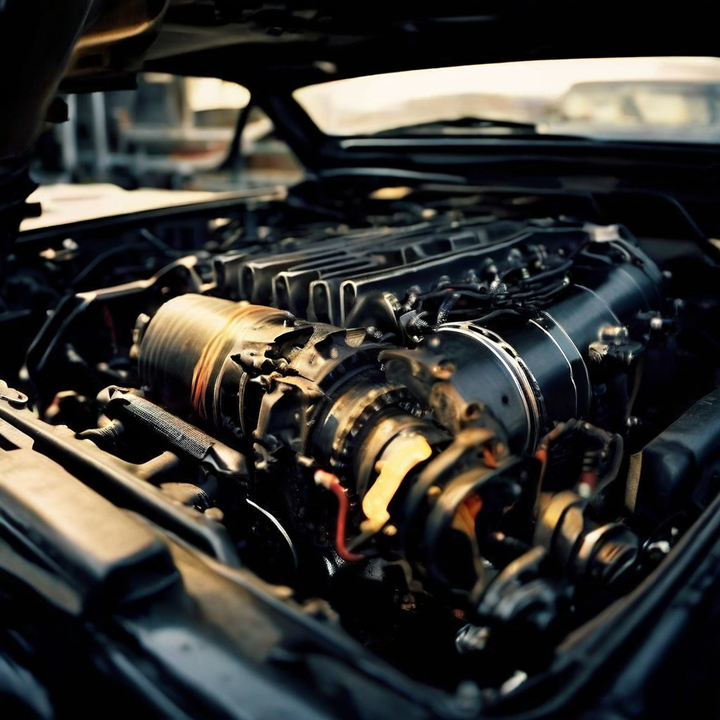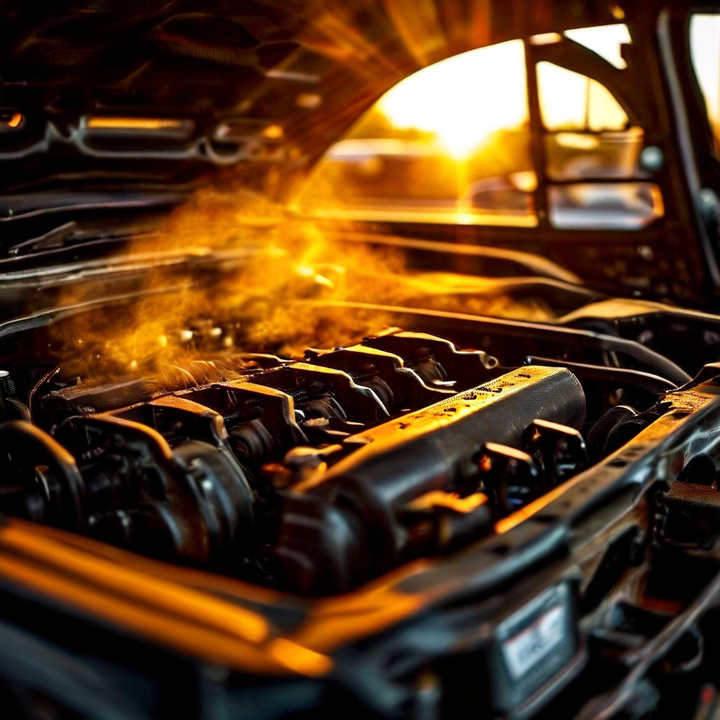


An engine is a complex machine with numerous moving parts that work together to generate power. Proper lubrication is crucial for the smooth operation and longevity of an engine. Engine oil serves as the primary lubricant, reducing friction between the moving components and preventing excessive wear and tear.

Before we dive into the specifics of how low oil can cause misfires, let's first appreciate the vital role that engine oil plays in keeping your vehicle running smoothly. Oil is the lifeblood of your engine, providing essential lubrication, cooling, and protection for its internal components.
Imagine your engine as a complex mechanical symphony, with pistons dancing up and down, valves opening and closing in perfect harmony, and bearings spinning effortlessly. Without proper lubrication, this symphony would quickly turn into a cacophony of metal-on-metal grinding, excessive heat, and premature wear.
| Engine Oil Functions | Description |
|---|---|
| Lubrication | Reduces friction and wear between moving parts |
| Cooling | Helps dissipate heat from internal components |
| Protection | Prevents corrosion and sludge buildup |
One of the primary functions of engine oil is to lubricate the moving parts within your engine. Pistons, piston rings, bearings, and valvetrain components all rely on a thin film of oil to reduce friction and wear. When oil levels drop too low, this protective barrier diminishes, leading to increased friction and potential compression leaks.
I vividly remember a case where a customer brought in their vehicle with a persistent misfire. Upon inspection, we discovered that the oil level was dangerously low, and the piston rings were severely worn, causing compression leaks and misfires. A simple oil change and piston ring replacement resolved the issue, and the engine regained its smooth operation.
Engine oil doesn't just lubricate; it also plays a crucial role in cooling and heat dissipation. As the engine runs, various components generate significant amounts of heat, which must be effectively dissipated to prevent overheating and potential damage.
With low oil levels, the engine's ability to transfer and dissipate heat is compromised, leading to increased temperatures in critical areas. This can cause pre-ignition or detonation, where the air-fuel mixture ignites prematurely, resulting in misfires and potential engine damage.
I recall a customer who brought in their vehicle with a misfire and overheating issues. Upon further investigation, we found that the oil level was critically low, and the engine had suffered from excessive heat buildup. After topping up the oil and replacing a few heat-damaged components, the misfire and overheating problems were resolved.
In modern engines, many manufacturers employ variable valve timing systems to optimize performance and fuel efficiency. These systems often rely on oil pressure to actuate and adjust the timing of the valves.
When oil levels are low, the resulting low oil pressure can cause erratic valve timing, leading to misfires and potential engine damage. I've encountered cases where a simple oil top-up and filter change resolved misfires caused by faulty variable valve timing systems.
In extreme cases of severely low oil levels, the engine may experience oil starvation, where the oil pump is unable to provide adequate oil flow to critical components like bearings and cylinder walls. This can lead to catastrophic failures, such as:
Seized bearings
Scored cylinder walls
Complete engine failure
I vividly remember a customer who neglected their vehicle's maintenance for far too long. When they finally brought it in, the engine was knocking and misfiring severely. Upon disassembly, we discovered that the bearings had seized due to a complete lack of oil, causing extensive damage to the engine block and crankshaft. Unfortunately, in cases like this, a complete engine replacement is often the only viable solution.
If you suspect that low oil levels are causing misfires in your vehicle, there are several diagnostic steps you can take:
Check the oil level: Start by checking the engine oil level using the dipstick. If it's below the minimum mark, top it up and see if the misfire goes away.
Listen for noises: Low oil levels often produce noises like knocking, ticking, or rattling from increased friction and wear. These noises can help pinpoint the affected areas.
Inspect for leaks: Look for any signs of oil leaks, which could be causing the low oil level and subsequent misfire.
Perform a compression test: A compression test can help identify compression leaks, which could be caused by worn piston rings or valve issues due to lack of lubrication.
Check the valve train: On engines with variable valve timing, inspect the valve train components for any signs of damage or excessive wear due to low oil pressure.
Depending on the root cause, repairs may involve:
| Repair | Description |
|---|---|
| Oil top-up or change | Replenishing or replacing the engine oil and filter |
| Piston ring replacement | Repairing or replacing worn piston rings |
| Bearing replacement | Replacing damaged bearings |
| Valve train repair | Fixing or replacing damaged valve train components |
| Leak repair | Addressing and fixing any oil leaks |
Always follow the manufacturer's recommended procedures and torque specifications when performing these repairs.
As the saying goes, "an ounce of prevention is worth a pound of cure." To prevent low oil levels from causing misfires and potential engine damage, follow these simple tips:

Regular oil checks: Make it a habit to check and top up the engine oil regularly, following the manufacturer's recommended intervals.
Timely oil changes: Adhere to the recommended oil change intervals, as old oil loses its lubricating and protective properties over time.
Use the correct oil type: Always use the correct oil type and viscosity recommended for your specific engine, as specified in the owner's manual.
Address leaks promptly: If you notice any oil leaks, have them addressed promptly to prevent further oil loss and potential damage.
Avoid excessive idling or high RPMs: When oil levels are low, avoid excessive idling or high RPM operation, as this can exacerbate the issue and potentially cause further damage.
| Maintenance Task | Frequency |
|---|---|
| Oil level check | Every few weeks or as recommended |
| Oil change | Every 3,000-5,000 miles or as recommended |
| Leak inspection | During routine maintenance or when low oil levels are detected |
The cost of repairs related to low oil levels and misfires can vary significantly depending on the extent of the damage and the specific components that need to be replaced. In general, topping up the oil or changing it is relatively inexpensive, but if internal engine components like bearings or piston rings need to be replaced, the cost can be substantial, potentially running into hundreds or even thousands of dollars for labor and parts.
It's important to weigh the cost of repairs against the overall value of your vehicle and make an informed decision on whether it's more cost-effective to repair or replace the engine altogether.
| Repair Type | Approximate Cost Range |
|---|---|
| Oil top-up or change | $20 - $100 |
| Piston ring replacement | $500 - $2,000 |
| Bearing replacement | $500 - $3,000 |
| Valve train repair | $500 - $2,500 |
| Engine replacement | $3,000 - $8,000 (or more) |
Note: These cost ranges are approximate and can vary depending on the make, model, and year of your vehicle, as well as the labor rates in your area.
In conclusion, low engine oil levels can indeed cause misfires and potentially lead to more severe engine damage if left unaddressed. As a mechanic, I've witnessed firsthand the importance of proper lubrication, cooling, and maintenance in ensuring the longevity and performance of your vehicle's engine.
By understanding the intricate relationship between oil levels and misfires, you can take proactive steps to prevent these issues and keep your vehicle running smoothly for years to come. Remember, a little bit of preventive maintenance can go a long way in avoiding costly repairs down the road.
So, fellow automotive enthusiasts, heed the advice of this seasoned mechanic:
Check your oil levels regularly
Follow recommended maintenance schedules
Address any issues promptly
Your engine will thank you for it, and you'll enjoy a smoother, more reliable driving experience.
Continuing to drive with low oil levels can lead to accelerated wear and tear on engine components, potentially resulting in catastrophic engine failure.
It's recommended to check your oil level at least once a month or before any long trips, and top it up if necessary.
Yes, severely low oil levels can cause permanent damage to critical components like bearings, cylinder walls, and pistons if not addressed promptly.
Common signs include increased engine noise, blue/gray exhaust smoke, reduced performance, and potential oil leaks or puddles under the vehicle.
It's generally safer to top up engine oil when the engine is cool to avoid potential burns or spills from the hot oil.
No, you should always use the recommended oil type and viscosity specified in your vehicle's owner's manual to ensure proper lubrication and performance.
Repair costs can vary significantly, ranging from a few hundred dollars for minor repairs to thousands for major component replacements or a complete engine rebuild.
Yes, low oil levels can lead to incomplete combustion, potentially increasing harmful emissions and triggering the check engine light.
Neither is ideal, as overfilling can cause oil leaks and underfilling can lead to insufficient lubrication. Always aim to maintain the recommended oil level.
While primarily affecting the engine, severely low oil levels can potentially cause issues with other systems that rely on proper lubrication, such as the transmission or power steering.

Sarah isn't your average gearhead. With a double major in Mechanical Engineering and Automotive Technology, she dived straight into the world of car repair. After 15 years of turning wrenches at dealerships and independent shops, Sarah joined MICDOT to share her expertise and passion for making cars run like new. Her in-depth knowledge and knack for explaining complex issues in simple terms make her a valuable asset to our team.













